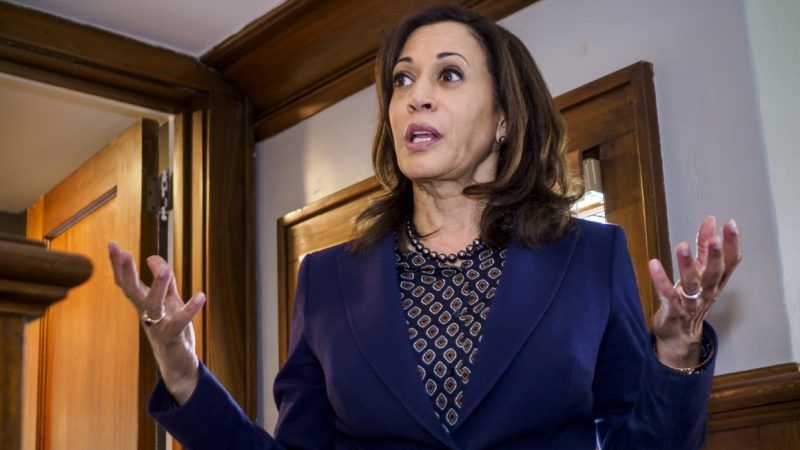Kamala Harris Offers a Crappy Apology to Parents Who Went to Jail Because Their Kids Missed School
Harris supported a truancy law that listed jail time as a punishment for parents.

Kamala Harris, the California senator and 2020 Democratic presidential candidate, has offered a half-hearted apology for a hardline truancy policy she championed as a prosecutor.
Back when she was district attorney of San Francisco, Harris was a vocal supporter of prosecuting the parents of children who missed a lot of school. "I believe a child going without an education is tantamount to a crime," she said in 2010. "So I decided I was going to start prosecuting parents for truancy."
The vast majority of murder victims age 25 or younger dropped out of high school, Harris has said. Her solution: Stop them from dropping out. It was a "groundbreaking strategy," she wrote in a 2009 op-ed for the San Francisco Chronicle. "To date, I have prosecuted 20 parents of young children for truancy. The penalty for truancy charged as a misdemeanor is a fine of up to $2,500 or up to a year of jail."
As a candidate for California attorney general, a position she assumed in 2011, Harris supported the ultimately successful passage of a statewide truancy law, The Washington Post reported. The law "states that a student missing more than 30 minutes of instruction without an excuse three times during the school year must be classified as a truant," according to the California Department of Education.
The parents of truant children were liable to be prosecuted, though as Vox noted, parents were normally only prosecuted if their kids missed more than a month. While no parents were jailed for truancy while Harris was DA of San Francisco, the state law she supported led to some California parents being put behind bars.
In an interview with Pod Save America host Jon Favreau that will air in full Wednesday night, Harris was asked if she would "support that kind of law, the California law, as president?"
"No," she responded. But Harris didn't appear ready to accept full responsibility for the parents who were sent to jail under the law she supported. "I had no control over that," she said, even though she could have prevented it by opposing the law, which included penalties of up to a year in jail.
The fact that some parents were locked up was an "unintended consequence," she added. "When I was DA, we never sent a parent to jail."
After explaining her reasoning for supporting the local truancy policy as San Francisco D.A., Harris expressed regret that the state law led to jail time for some parents. "My regret is that, I have now heard stories where, in some jurisdictions, DAs have criminalized the parents," Harris said. "And I regret that that has happened and the thought that anything I did could have led to that, because that was certainly not the intention," she added, again emphasizing that jail time for parents "never was the intention."
It's worth noting, as the Post did last month, that when discussing her past support for anti-truancy policies, Harris focuses on her time as district attorney, not on what happened to parents while she was attorney general. This makes sense, as it's much easier to defend a policy that didn't result in parents going to jail.
Harris has used the "unintended consequence" defense to massage her record before. As Reason's C.J. Ciaramella reported in February, Harris was asked about her previous support for a San Francisco policy to report undocumented juveniles who had been arrested to federal immigration officials. "That ended up being an unintended consequence of the policy and I did not support that consequence of that policy. And that policy I believe has since changed because it was not the intended purpose of that policy," Harris said. In fact, this was the explicit policy of the city, and Harris opposed a push to change it.
Harris has tried to massage her record in other areas as well. In February, The Root asked Harris about her prior support for FOSTA, the disastrous anti-sex trafficking law that made it a federal crime to host web content that "facilitates prostitution." Harris now says she's not necessarily opposed to decriminalizing consensual sex work, but she still would not denounce FOSTA.
She also said she wants bad actors in sex work to be prosecuted. In theory, she's right, but those bad actors often turn out to be clients who pay women for consensual sex. In the past, Harris has supported cracking down on these "johns."
Or consider her position on drugs. Harris now supports legalizing marijuana for recreational use, but as a prosecutor, she opposed legalization for years. And while she's fine with legalized weed, she wrote in her memoir The Truths We Hold that she still wants to give law enforcement money to "cut off the supply of fentanyl from China" and to "reinstate the DEA's authority to go after the major pharmaceutical manufacturers and distributors." In short, she's still a drug warrior.
In all of these areas—truancy, immigration, sex work, and drugs—Harris' views appear to have evolved for the better. But that doesn't mean she can or should avoid responsibility for the harm caused by policies she previously supported.


Show Comments (52)